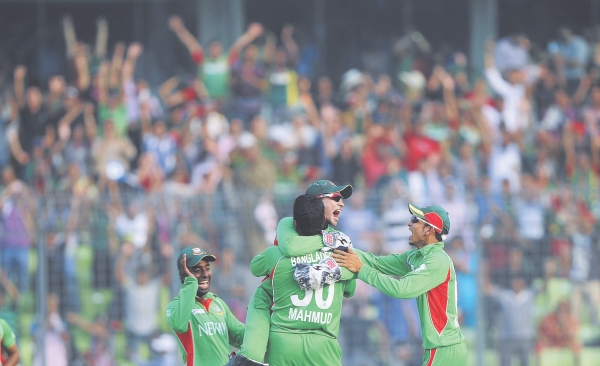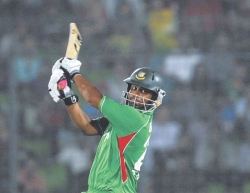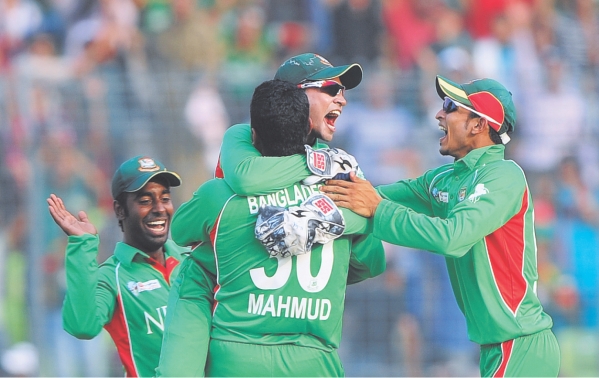| Home - Back Issues - The Team - Contact Us |
 |
| Volume 11 |Issue 13| March 30, 2012 | |
|
|
Special Feature
The Beginning of a New Phase Having reached the finals of the Asia Cup, the Bangladesh cricket team has put behind a disappointing 2011 and has announced its revival in international cricket. The Star analyses the different factors that helped the men in green finally come of age. Naimul Karim Only once before did the Bangladeshi cricket team manage to achieve something as sizeable as reaching the finals of a competitive international tournament, including some of the most competitive teams in the world. That moment came against New Zealand in 2010 when the Tigers achieved their first ever 'whitewash' against a 'top-tier' cricketing nation. The post-series scenario was quite similar back then. Both cricketing pundits and the media hailed the Bangladeshi Cricket Team, fans went haywire over Shakib Al Hasan and Rubel Hossain's performances, they called Bangladesh the next 'Sri Lanka' in the making and for a moment it seemed like the 'minnows' tag on the Bangladeshi cricket team, was going to be removed forever. However, a disappointing world cup campaign followed by dreadful performances against Australia, Zimbabwe and Pakistan highlighted an uneventful 2011 for the Tigers. Teamwork, the new Hope
From the very first game of the tournament it was a combined effort that took Bangladesh ahead. The fact that five batsmen scored more than 40 runs in the chase against India itself proved that the Bangladeshi players had a plan in mind, which against the odds, was employed successfully. In a similar way, the match against Sri Lanka saw Tamim and Shakib play aggressive innings in a bid to chase down the slightly reduced total within 40 overs. The free-flowing strokes came as a result of the newly-found belief in the team's middle order, which was boosted by the inclusion of Nasir Hossain. And that is also perhaps the reason why thousands of supporters, who would earlier walk out or stop watching the match after the fall of a Tamim or a Shakib, held on to their seats nervously during the Asia cup; thriving on the new found hope and believing in the team as a whole. A New kind of Pressure The scenario was completely different this time. Entering the tournament after a dreadful year, the Bangladeshis required more than just a win to answer their critics. Having said that, they also had to deal with the pressure of finishing the game, which they failed to do so against Pakistan on two occasions; but at the same time, they were successful against India and Sri Lanka.
The Winning Habit and the Masrafe Factor The under-19 squad led by Rahim in 2006, in fact was considered as one of the strongest teams in the world after having defeated five of the top-most cricketing nation. Their inclusion in the 2007 world cup witnessed an almost immediate response as Bangladesh went on to defeat India and South Africa in the tournament. It therefore isn't a surprise to see these players forming the backbone of the Bangladeshi team today. The return of Masrafe Bin Mortuza to the side was another factor that propelled the team. With the bowling partnership of Rubel and Shafiul yielding an average economy rate of above 6, in the year 2011, a fully-fit Mortuza was a blessing for the Bangladeshi cricket team. Apart from plugging the runs and providing a platform for the traditional slow-left arm attack, Mortuza has also reportedly had a calming effect on the team. Even coach Stuart Law was amazed at the kind of influence, the Narail-based bowler had on the players. One hopes that Mortuza eludes any further injuries and continues the good run. The scenario of Bangladeshi cricket has changed by a large degree in the last couple of years. The results of the recently concluded Asia Cup prove that no matter how a strong a team, they'll always have to battle it out against the Tigers to beat them in their own den. However, it isn't merely enough to be strong side at home. In order to continue the good form, Bangladeshi Cricket Board (BCB) needs to organise 'away' tours and play a lot more test cricket. Instead of trying to establish an autocratic-sort-of-foothold on the team selection or attempting to reverse decisions of international matches, the BCB should try to nurture this young team into a powerful force in the coming years.
Copyright
(R) thedailystar.net 2012 |
||||



